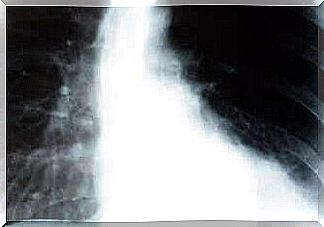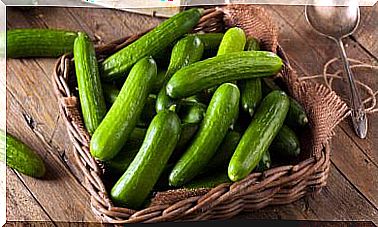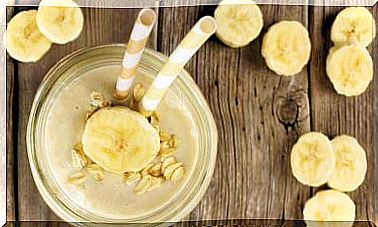The Role Of Diet In Inflammatory Bowel Disease

Malnutrition is a common trait in people with digestive problems, so diet therefore plays a big role; especially in the case of inflammatory bowel disease. This is because what you eat can reduce and relieve your symptoms. Read on to learn more about this.
The digestive tract can suffer from all sorts of conditions that can affect our health, and inflammatory bowel disease (IBD) is one of them. This term therefore describes chronic diseases of the digestive tract, for unknown reasons, which are characterized by inflammation.
The two most common types of inflammatory bowel disease are chronic ulcerative colitis and Crohn’s disease. In addition, there is a third entity known as indeterminate colitis. It shares characteristics with the other two and, as it develops, it can sometimes be identified as one of the two conditions.
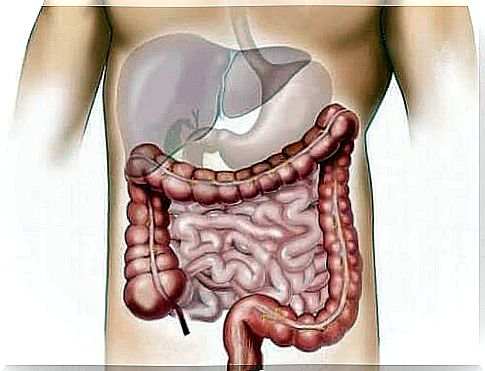
Characteristics of inflammatory bowel disease
Crohn’s disease
This can affect any part of the digestive tract, but the most common areas are the distal small intestine and the ascending colon. The lesions are segmented and can damage all layers of the intestinal wall.
Ulcerative colitis
This only affects the colon and rectum. In addition, the lesions are continuous and occur on the mucosa and submucosal membrane. These diseases alter the function of the immune system in the digestive tract, leading to a prolonged inflammatory response.
Symptoms of inflammatory bowel disease
The most common symptoms of both conditions are severe colic and chronic bloody diarrhea. However, weight loss, malnutrition, fever, and skin and joint damage can also occur.
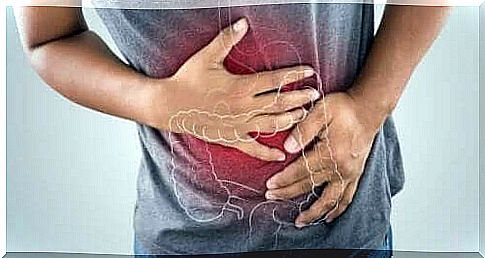
Damage to the intestinal mucosa causes various associated nutritional problems, for example:
- Anorexia
- Edema
- Anemia
- Dehydration
- Loss of proteins and vitamins
- Changes in the mineral balance of zinc, iron, magnesium, calcium and selenium.
Causes of malnutrition
Malnutrition occurs due to various factors:
- Reduced food intake
- The disease leads to pain, diarrhea and vomiting
- Exclusion of certain foods
- Increased demands due to fever, stress and protein loss
- Malabsorption of nutrients
- Interaction between medicines and nutrients. According to the FEAD ( Fundación Española del Aparato Digestivo ), the medicines used to treat these conditions are anti-inflammatory drugs, corticosteroids, immunosuppressants and antibiotics.
What should one eat if one suffers from inflammatory bowel disease?
Note that all inflammatory bowel diseases have remission phases, but there are phases where the symptoms reappear with acute episodes. The diet should therefore be based on the stage you are at. A healthy diet plan can be managed without unnecessary restrictions when there are no symptoms.
In the case of acute periods, you need to adjust your diet to meet your nutritional needs. It is important that you make several meals during the day, consume plenty of safe water and avoid extremely cold temperatures.
A diet with short-chain carbohydrates or FODMAP is beneficial during any treatment. However, you must remember that the diet must have the following proportions:
- 50 to 60% of the calories must be carbohydrates
- 15 to 20% protein
- 25 to 30% fat, but these are limited if there is a loss due to diarrhea.
We must not forget that severe malnutrition in some cases can develop with intestinal compromise. In this situation, the alternative is parenteral nutrition.

What foods should be avoided when there are symptoms?
You must avoid any food that produces gas and discomfort during the symptomatic phase. Among them we find:
- Legumes and grains
- Dairy products, mainly milk
- Potatoes, sweet potatoes, corn, cassava, garlic, onions and cabbage
- Hard and spicy cheeses
- Fresh and dried fruit
- Honey, sugar, syrup and jam sweetened with xylitol or sorbitol
- Processed meat, sausages and its derivatives
- Alcoholic, carbonated beverages and soft drinks, fermented beverages and coffee
- Strong or very spicy food
In addition, you need to consider whether there are vitamin and mineral deficiencies. You can resort to supplements in these cases.
Follow this diet when you are not experiencing symptoms
Because of everything we mentioned above, you need to gradually reintroduce restricted foods when the symptoms go away. In general, you can start with:
- Cooked vegetables rich in soluble fiber such as squash, carrots and beets.
- Refined grain and its derivatives.
- Steamed or baked fruits such as apples, ripe bananas, apricots, peaches and pears.
- Low fat pieces of meat such as fish and chicken
Finally, we must note that it can take several weeks to make progress in the diet, and it must be adapted to the patient’s needs. The time between one progression and the next depends on the symptoms. To summarize, the key to eating in case of inflammatory bowel disease is to adapt the diet to each patient’s symptoms and phases.



